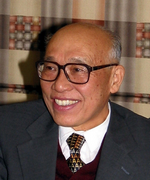
Zhang Liwen
SCHOOL OF PHILOSOPHY RENMIN UNIVERSITY OF CHINA
Personal profile
Born in April 1935 in Wenzhou, Zhejiang, Professor Zhang is a member of the Communist Party of China and a renowned philosopher and historian of philosophy. He is an Honorary First-Class Professor at Renmin University of China. Professor Zhang is a pioneer in establishing the theoretical frameworks of Chinese philosophy’s logical structures, Traditionics(传统学), and the theory of New Theory of Man(新人学). He developed the Philosophy of Harmony(和合学), which is based on five principles: Harmonious Living(和生), Harmonious Relationship(和处), Harmonious Establishment(和立), Harmonious Communication(和达), and Harmonious Love(和爱).
Professor Zhang has published over 700 academic papers and authored more than 40 monographs, including Harmony and Cooperation Theory: Culture Strategy Thinking for 21st Century, On the Philosophy of Harmony, Introduction to Traditionics, Chinese Traditional Culture and a Community with a Shared Future for Mankind, and Zhang Liwen's Academic Autobiography. He has also served as the editor for over 40 works, including A New Introduction to the History of Chinese Philosophy, A General History of Chinese Scholarship, and International Confucian Canon: Korean Part, Four Books Section. The Korean Studies Information CO. has published The Collected Works of Zhang Liwen (Volume 38).
In 1982, Zhang was recognized as an "Advanced Worker" at Renmin University of China. In 1987, his work Research on Song-Ming Neo-Confucianism received the Second Prize for Outstanding Achievements in Philosophy and Social Sciences in Beijing. At the same year, he was awarded the International Toegye Academic Prize by The International T'oegyehak Society(국제퇴계학회) and The Toegye Studies Institute(퇴계학연구원). In 1990, he was appointed as a prominent young and middle-aged expert with outstanding contributions by the state, receiving special government subsidies. His book The History of the Evolvement of Chinese Philosophical Categories(Book Ⅰ Tao of Heaven) won the Third Prize at the First Guangming Cup for Outstanding Achievements in Social Sciences in 1991, and it was awarded the Special Prize for Outstanding Academic Works by the Ministry of Education in 1992. His work Towards the Path of the Heart: The Footsteps of Lu Xiangshan's(陆象山) Thought won the National Excellent Ancient Books Award in 1994. In 1996, The Historical Development of Chinese Philosophy Categories: Ren Chapter(Book II Tao of Human) received the First Prize for Outstanding Achievements in Philosophy and Social Sciences in Beijing and the Third Prize for Outstanding Achievements from the National Social Science Fund in 1998. His book Traditional Culture and Modernization won the Third National Book Golden Key Award in 1998, while Research on Li Toegye's(李退溪) Thought received the First Prize for Outstanding Achievements in Philosophy and Social Sciences in Beijing. In 2000, A Critical Biography of Zhu Xi(朱熹) was awarded the First Prize for Outstanding Achievements in Philosophy and Social Sciences in Beijing. His work Correct Scholarship and New Developments: The Philosophy of Wang Chuanshan(王船山) won the Second Prize for Outstanding Achievements in Philosophy and Social Sciences in Beijing in 2002. In 2006, he was the chief editor of the Wei, Jin, Southern and Northern Dynasties volume of A General History of Chinese Scholarship (6 volumes), which received the Third Prize for Outstanding Achievements in Humanities and Social Sciences from the Ministry of Education. This work was also nominated for the First Chinese Publishing Government Award by the General Administration of Press and Publication in 2007. In 2009, Harmony and Cooperation Theory: Culture Strategy Thinking for 21st Century won the Third Prize for Outstanding Research Achievements in Humanities and Social Sciences. His book The Historical Evolution of Trends in Chinese Philosophy was included in the "National Social Science Fund Achievement Library" in 2013 and received the National Studies Award at the Third Global Chinese National Studies Conference in 2018. In 2020, it won the First Prize for Outstanding Achievements in Higher Education Research from the Ministry of Education.
Professor Zhang proposed the concept of "Chinese Philosophy’s Logical Structures," publishing his book in 1989, which made significant advancements in the interpretation of Chinese philosophical texts and innovative reasoning. He constructed the philosophical system of the Philosophy of Harmony in 1996, he published Introduction to Chinese Philosophy of Harmony, creatively exploring solutions for the value of cultural harmony between East and West and the modern transformation of traditional culture, presenting Chinese culture to the world in a new light. Professor Zhang reexamined Chinese philosophy through the lens of the Philosophy of Harmony and published The Historical Evolution of Trends in Chinese Philosophy and Chinese Meta-Philosophy. The former provides a comprehensive and fresh perspective on over 2,000 years of Chinese philosophical development, merging historical thought with contemporary understanding, making it a significant contribution to the philosophy of history. The latter identifies seven fundamental principles of Chinese philosophy, reflecting on the relationships between humanity and nature, society, human values, and ideals, encapsulating the essence of Chinese philosophy and making a vital contribution to the development of the discipline in China.

